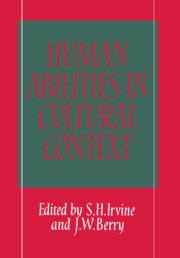Book contents
- Frontmatter
- Contents
- List of contributors
- Preface
- Acknowledgments
- Part I Human abilities in theoretical cultures
- Part II Cultural responses to ability measurement
- Part III Cultural limits upon human assessment
- 15 Native North Americans: Indian and Inuit abilities
- 16 Aboriginal cognition and psychological nescience
- 17 Testing Bushmen in the Central Kalahari
- 18 Caste and cognitive processes
- 19 Educational adaptation and achievement of ethnic minority adolescents in Britain
- 20 The diminishing test performance gap between English speakers and Afrikaans speakers in South Africa
- Author index
- Subject index
16 - Aboriginal cognition and psychological nescience
from Part III - Cultural limits upon human assessment
Published online by Cambridge University Press: 13 January 2010
- Frontmatter
- Contents
- List of contributors
- Preface
- Acknowledgments
- Part I Human abilities in theoretical cultures
- Part II Cultural responses to ability measurement
- Part III Cultural limits upon human assessment
- 15 Native North Americans: Indian and Inuit abilities
- 16 Aboriginal cognition and psychological nescience
- 17 Testing Bushmen in the Central Kalahari
- 18 Caste and cognitive processes
- 19 Educational adaptation and achievement of ethnic minority adolescents in Britain
- 20 The diminishing test performance gap between English speakers and Afrikaans speakers in South Africa
- Author index
- Subject index
Summary
Introduction
The aim of this chapter is to focus attention on Australian Aboriginal cognitive skills in their cultural context. The intention is not to provide a review of all cognitive research findings about Aborigines: The total body of research work, with a few exceptions, has been assessed by psychologists themselves as “grossly inadequate” (Kearney & McElwain, 1976). In a more recent comprehensive summary, Watts (1982) tabulated research studies of Aboriginal cognitive abilities from 1967 onwards, and concluded that the majority had simply contributed to an overwhelming emphasis on “deficit” (compare McShane & Berry, Chapter 15).
The intent here is rather to assemble available research evidence relating to Aboriginal cognitive skills and expertise. Initially this will involve sifting or “noodling” through earlier research findings (in certain parts of central Australia, Aborigines, venturesome whites, and passing researchers are known occasionally to go noodling: This entails painstakingly searching through the deserted mullock heaps for small opals that may have been overlooked by the opal miners who originally created the mullock, or mining refuse). Such research noodling can sometimes yield gemlike evidence of value suggesting that Aboriginal cognitive proficiency may have been adequately sampled in certain circumstances but may not have been recognized as such within the interpretive framework of the time or of particular researchers.
More recent research studies which have specifically identified and analysed cognitive skills valued within Aboriginal contexts will then be considered. Such research has been characterised by recognition of Aboriginal cognitive competence, in contrast to earlier perceptions of cognitive skill variations as intellectual deficits, and has also been due to the reconceptualisation of cognition in terms of context-sensitive processes or operations instead of inherent properties or capacities.
- Type
- Chapter
- Information
- Human Abilities in Cultural Context , pp. 427 - 452Publisher: Cambridge University PressPrint publication year: 1988
- 5
- Cited by



